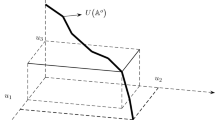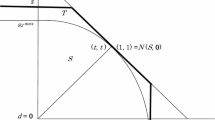Abstract
We analyze bilateral bargaining over a finite set of alternatives. We look for "good" ordinal solutions to such problems and show that Unanimity Compromise and Rational Compromise are the only bargaining rules that satisfy a basic set of properties. We then extend our analysis to admit problems with countably infinite alternatives. We show that, on this class, no bargaining rule choosing finite subsets of alternatives can be neutral. When rephrased in the utility framework of Nash (1950), this implies that there is no ordinal bargaining rule that is finite-valued.
Similar content being viewed by others
References
Anbarcı N(2005) Finite alternating-move arbitration schemes and the equal area solution. Theory Decis (forthcoming)
Brams S, Kilgour DM (2001) Fallback bargaining. Group Decis Negoti 10:287–316
Hurwicz L, Sertel MR (1997) Designing mechanisms, in particular for electoral systems: the majoritarian compromise. Department of Economics, Boğaziçi University, İstanbul (preprint)
Kalai E, Smorodinsky M (1975) Other solutions to Nash’s bargaining problem. Econometrica 43:513–518
Kalai E (1977) "Proportional solutions to bargaining situations: interpersonal utility comparisons. Econometrica 45:1623–1630
Kalai E, Rosenthal RW (1978) Arbitration of two-party disputes under ignorance. Int J Game Theory 7:65–72
Kıbrıs Ö (2002) Nash bargaining in ordinal environments. Sabancı University Economics Discussion Paper, suecdp-02-02, at http://www.sabanciuniv.edu/ssbf/economics/eng/research/index. html.
Kıbrıs Ö (2004) Egalitarianism in ordinal bargaining: the Shapley–Shubik rule. Games Econ Behav 49(1):157–170
Mariotti M(1998) Nash bargaining theory when the number of alternatives can be finite. Soc Choice Welfare 15:413–421
Maskin E (1986) The theory of implementation in Nash Equilibria: a survey. In: Hurwicz L, Schmeidler D, Sonnenschein M (eds) Social goods and social organization: volume in memory of Elisha Pazner. Cambridge University Press, Cambridge
Nagahisa R, Tanaka M (2002) An axiomatization of the Kalai–Smorodinsky solution when the feasible sets can be finite. Soc Choice Welfare 19:751–761
Nash JF (1950) The bargaining problem. Econometrica 18:155–162
Roemer J(1996) Theories of distributive justice. Harvard University Press, Cambridge
Roth AE (1979) Axiomatic models of bargaining. Springer, Berlin Heidelberg New york
Rubinstein A, Safra Z, Thomson W (1992) On the interpretation of the Nash bargaining solution and its extension to non-expected utility preferences. Econometrica 60:1171–1186
Sertel MR (1985) Lecture notes in microeconomic theory. Boğaziçi University (unpublished manuscript)
Sertel MR, Yılmaz B (1999) The Majoritarian Compromise is majoritarian-optimal and subgame-perfect implementable. Soc Choice Welfare 16:615–627
Sertel MR, Yıldız M (2003) The impossibility of a Walrasian bargaining solution. In: Koray S, Sertel MR (eds) Advances in economic design. Springer, Berlin Heidelberg New York
Shapley L (1969) Utility comparison and the theory of games. In: La Décision: Agrégation et Dynamique des Ordres de Préférence. Editions du CNRS, Paris, pp 251–263
Shubik M (1982) Game theory in the social sciences. MIT Press, Cambridge
Thomson W (1994) Cooperative models of bargaining. In: Aumann RJ, Hart S (eds) Handbook of game theory, Vol II. North-Holland
Thomson W (1996) Bargaining theory: the axiomatic approach, book manuscript
Author information
Authors and Affiliations
Corresponding author
Additional information
Professor Sertel passed away on January 25, 2003.
Rights and permissions
About this article
Cite this article
Kıbrıs, Ö., Sertel, M.R. Bargaining over a finite set of alternatives. Soc Choice Welfare 28, 421–437 (2007). https://doi.org/10.1007/s00355-006-0178-z
Received:
Accepted:
Published:
Issue Date:
DOI: https://doi.org/10.1007/s00355-006-0178-z




